
- Media library
- Question limits
- Creating a survey from MS Word doc
- How to edit live surveys
- Survey blocks
- Survey block randomizer
- Question randomization
- Scale Library
- What is monadic testing?
- What is sequential monadic testing?
- Extraction Support for Image Chooser Question Types
- What is comparison testing?
- Custom validation messages
- Survey Builder with QuestionPro AI
- Testing Send
- Survey Preview Options
- Add Questions From a Document
- Survey Authoring 2025
- Standard question types
- Multiple choice question type
- Text question- comment box
- Matrix multi-point scales question type
- Rank order question
- Smiley-rating question
- Image question type
- Date and time question type
- reCAPTCHA question type
- Net Promoter Score question type
- Van Westendorp's price sensitivity question
- Choice modelling questions
- Side-By-Side matrix question
- Homunculus question type
- Predictive answer options
- Presentation text questions
- Multiple choice: select one
- Multiple choice: select many
- Page timer
- Contact information question
- Matrix multi-select question
- Matrix spreadsheet question
- Closed card sorting question
- Flex Matrix
- Text Slider Question Type
- Graphical Rating Scales
- Rank Order - Drag and Drop
- Bipolar Matrix - Slider
- Bipolar Matrix Likert Scale
- Gabor Granger
- Verified Digital Signature
- Star Rating Question Type
- Push to social
- Attach Upload File Question
- Constant Sum Question
- Video Insights
- Platform connect
- Communities Recruitment
- TubePulse
- Open Card Sorting
- Map Question Type
- LiveCast
- Answer type
- Reorder questions
- Question tips
- Text box next to question
- Text question settings
- Adding other option
- Matrix question settings
- Image rating question settings
- Scale options for numeric slider question
- Constant sum question settings
- Setting default answer option
- Exclusive option for multiple choice questions
- Validate question
- Bulk validation settings
- Remove validation message
- Question separators
- Question Code
- Page breaks in survey
- Survey introduction with acceptance checkbox
- RegEx Validation
- Question Library
- Embed Media
- Slider Start Position
- Answer Display - Alternate Flip
- Matrix - Auto Focus Mode
- Text validations
- Numeric Input Settings- Spreadsheet
- Answer Groups
- Hidden Questions
- Decimal Separator Currency Format
- Allow Multiple Files - Attache/Upload Question Type
- Text box - Keyboard input type
- Deep Dive
- Answer Display Order
- Alternate colors
- Conjoint Best Practices
- Multi-media file limits
- Conjoint Prohibited Pairs
- Add logo to survey
- Custom Themes
- Display Settings
- Auto-advance
- Progress bar
- Automatic question numbering option
- Enabling social network toolbar
- Browser Title
- Print or export to PDF, DOC
- Survey Navigation Buttons
- Accessible Theme
- Back and Exit Navigation Buttons
- Focus Mode
- Survey Layout
- Survey Layout - Visual
- Telly Integration
- Telly Integration
- Workspace URL
- Classic Layout
- Branching - Skip Logic
- Compound Branching
- Compound or delayed branching
- Response Based Quota Control
- Dynamic text or comment boxes
- Extraction logic
- Show or hide question logic
- Dynamic show or hide
- Scoring logic
- Net promoter scoring model
- Piping text
- Survey chaining
- Looping logic
- Branching to terminate survey
- Logic operators
- Selected N of M logic
- JavaScript Logic Syntax Reference
- Block Flow
- Block Looping
- Scoring Engine: Syntax Reference
- Always Extract and Never Extract Logic
- Matrix Extraction
- Locked Extraction
- Dynamic Custom Variable Update
- Advanced Randomization
- Custom Scripting Examples
- Survey Logic Builder - AI
- Custom Scripting - Custom Logic Engine Question
- Survey settings
- Save & continue
- Anti Ballot Box Stuffing (ABBS) - disable multiple responses
- Deactivate survey
- Admin confirmation email
- Action alerts
- Survey timeout
- Finish options
- Spotlight report
- Print survey response
- Search and replace
- Survey Timer
- Allowing multiple respondents from the same device
- Text Input Size Settings
- Admin Confirmation Emails
- Survey Close Date
- Respondent Location Data
- Review Mode
- Review, Edit and Print Responses
- Geo coding
- Dynamic Progress Bar
- Response Quota
- Age Verification
- Tools - Survey Options
- Live survey URL
- Customize survey URL
- Create email invitation
- Personalizing emails
- Email invitation settings
- Email list filter
- Survey reminders
- Export batch
- Email status
- Spam index
- Send surveys via SMS
- Phone & paper
- Adding responses manually
- SMS Pricing
- Embedding Question In Email
- Deleting Email Lists
- Multilingual Survey Distribution
- SMTP
- Reply-To Email Address
- Domain Authentication
- Email Delivery Troubleshooting
- QR Code
- Email Delivery and Deliverability
- Survey Dashboard - Report
- Overall participant statistics
- Dropout analysis
- Pivot table
- Turf analysis
- Trend analysis
- Correlation analysis
- Survey comparison
- Gap analysis
- Mean calculation
- Weighted mean
- Cluster Analysis
- Dashboard filter
- Download Options - Dashboard
- HotSpot analysis
- Heatmap analysis
- Weighted Rank Order
- Cross-Tabulation Grouping Answer Options
- A/B Testing in QuestionPro Surveys
- Data Quality
- Data Quality Terminates
- Matrix Heatmap Chart
- Column proportions test
- Response Identifier
- TURF Reach Analysis
- Bulk Edit System Variables
- Weighting and balancing
- Conjoint analysis designs
- Conjoint part worths calculation
- Conjoint calculations and methodology
- Conjoint attribute importance
- Conjoint profiles
- Market segmentation simulator
- Conjoint brand premium and price elasticity
- What is MaxDiff scaling
- MaxDiff settings
- Anchored MaxDiff Analysis [BETA Release]
- MaxDiff FAQ
- MaxDiff- Interpreting Results
- Automatic email report
- Data quality - Patterned responses
- Data quality - gibberish words
- Import external data
- Download center
- Consolidate report
- Delete survey data
- Data quality - All checkboxes selected
- Exporting data to Word or Powerpoint
- Scheduled reports
- Datapad
- Notification Group
- Unselected Checkbox Representation
- Merge Data 2.0
- Plagiarism Detection
- IP based location data
- SPSS Export
- SPSS variable name
- Update user details
- Update time zone
- Teams
- Add Users
- Usage dashboard
- Single user license
- License restrictions
- Troubleshooting login issues
- Software support package
- Welcome Email
- User Roles & Permissions
- Bulk Add Users
- Two-Factor Authentication
- Network Access
- Changing ownership of the survey
- Unable to access Chat support
- Navigating QuestionPro Products
- Agency Partnership Referral Program
- Response Limits
Domain Authentication
Domain authentication confirms the identity of the sender through various methods to distinguish genuine messages from fraudulent ones. By taking control of your email domain, you demonstrate to mailbox providers that you're a legitimate sender, making it harder for spammers to impersonate you.
While establishing brand legitimacy with domain authentication might not be as exciting as designing templates or crafting the perfect message, it's crucial for ensuring your emails don’t end up in the spam folder. Effective email deliverability begins with proper setup and authentication right from the start.
Below is a quick snapshot of how you can authenticate your E-mail domain within your QuestionPro account.
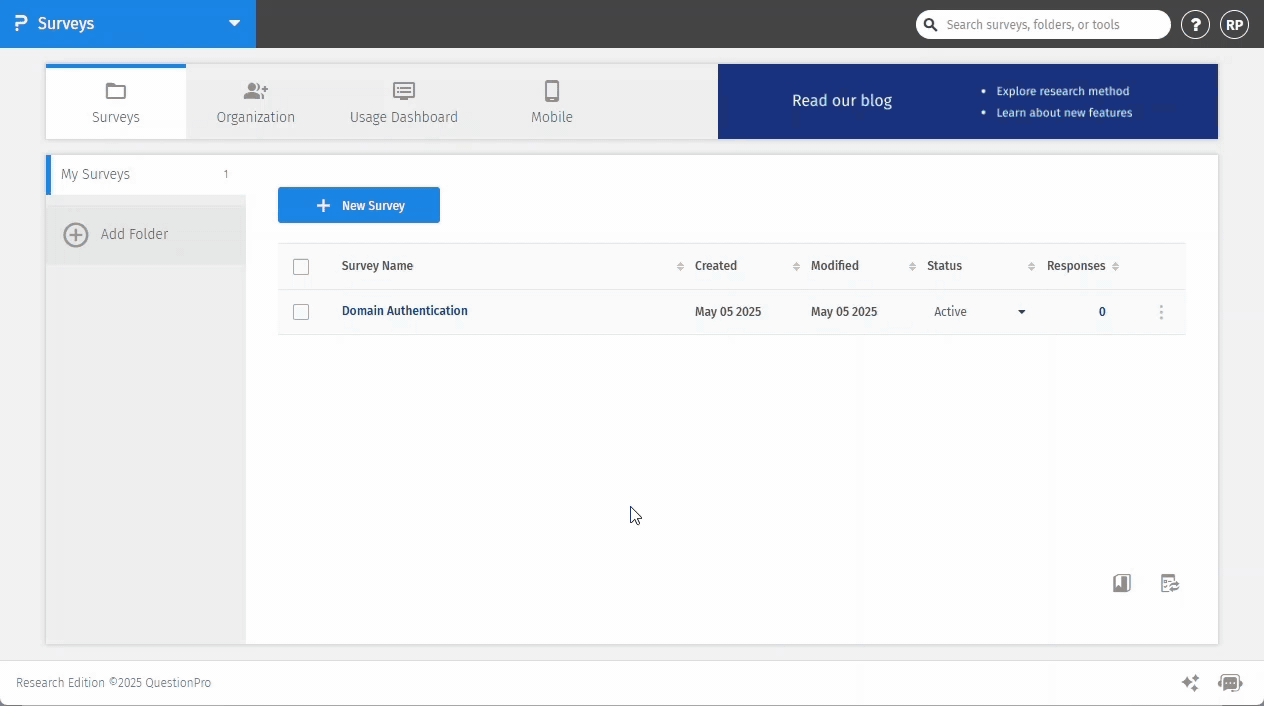
To authenticate your domain with QuestionPro email servers, follow the steps below:
- Go to User Profile >> My Account
- Click on Domain Authentication option in the left navigation menu. Click on New Domain button.
- In the pop-up, enter your email domain and click on the Next button.
- In the pop-up, you'll get the SPF record. Copy the SPF record and add it to your DNS. Then click on Generate DKIM Key button.
- In the pop-up, you'll get the DKIM selector and the DKIM key. Copy the selector and the key and add it to your DNS. Then click on the Finish button.
- Your email domain will be added in the list with Unverified status. Once you have added the SPF and DKIM key on your DNS, you can use the verify button to verify your domain.
- If you have added the SPF record and the DKIM key on your DNS then after clicking the verify icon you'll see the updated status for the domain. The status on an email domain is updated to Verified after the SPF and DKIM is added properly and DMARC is aligned.
- Do make sure you have a valid DMARC record on your domain's DNS to authenticate the domain successfully.
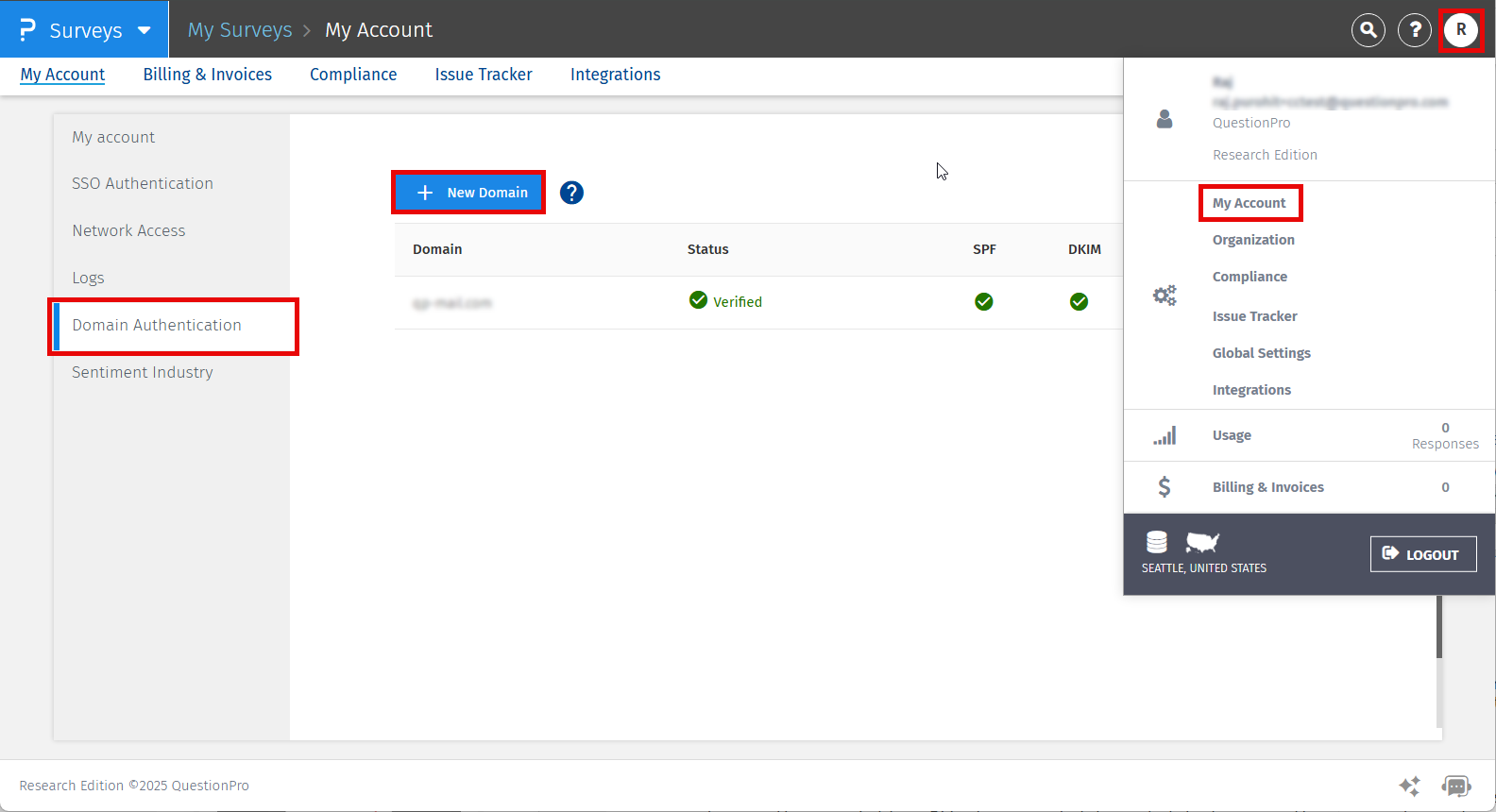
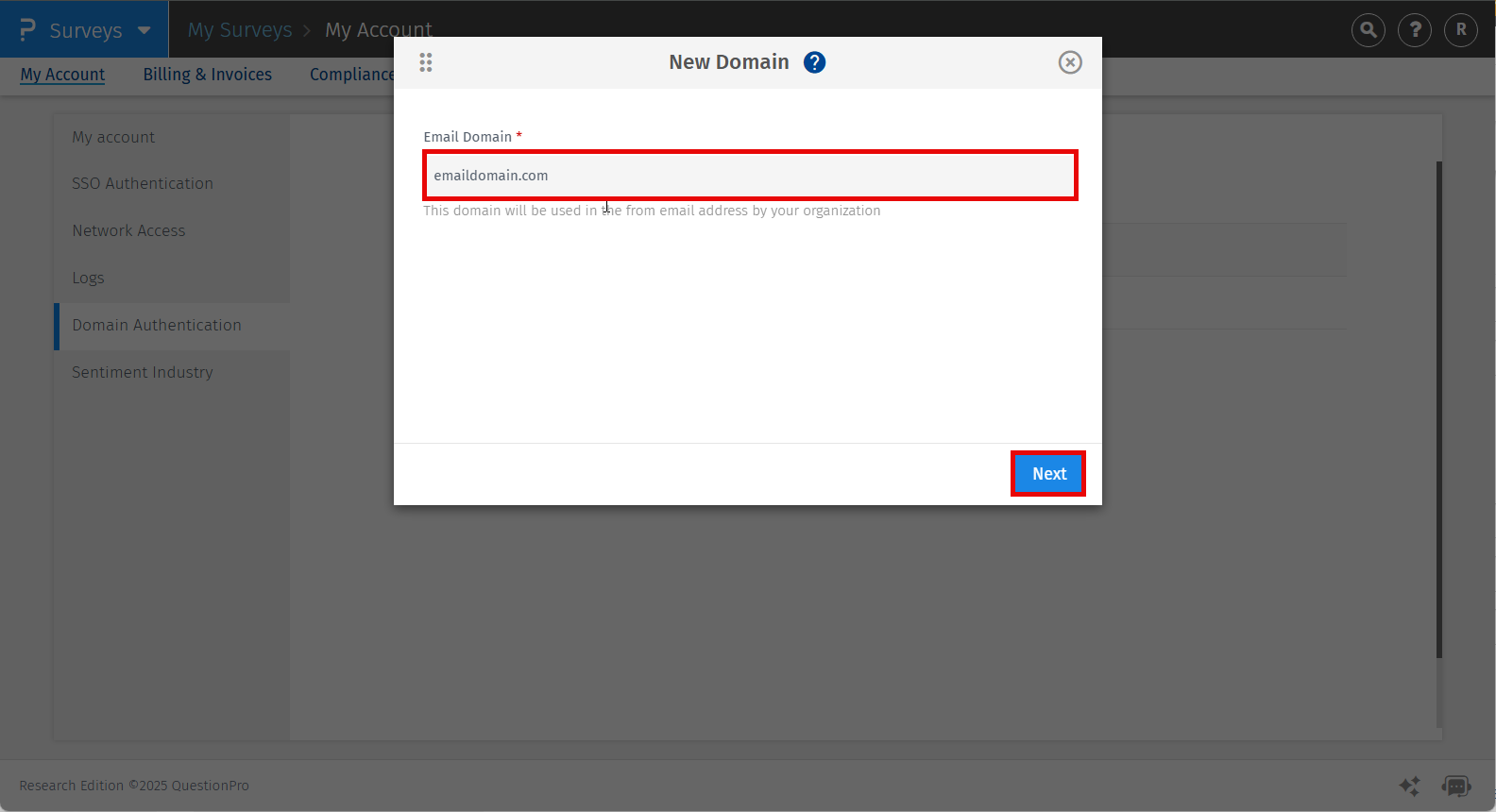
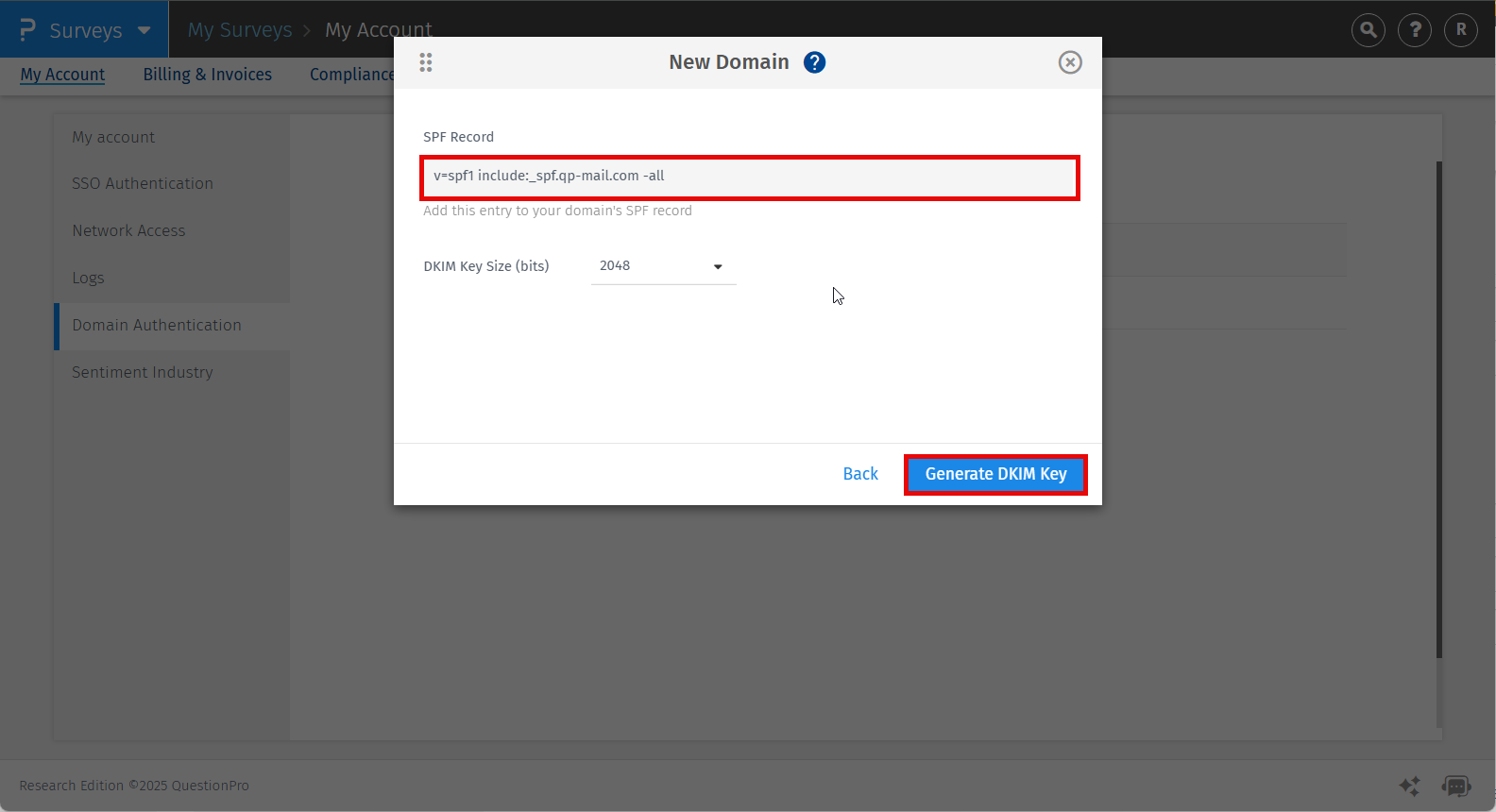
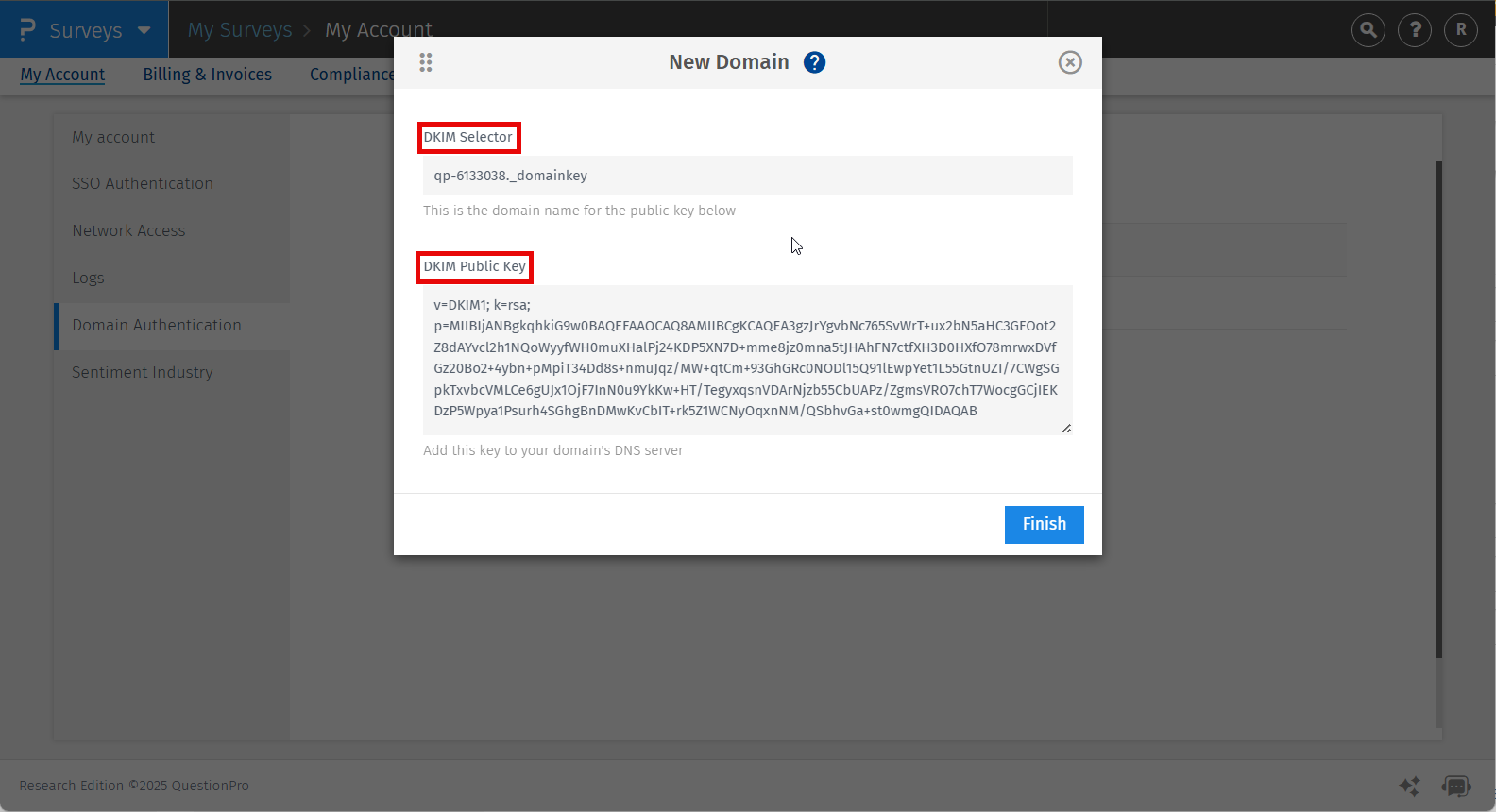
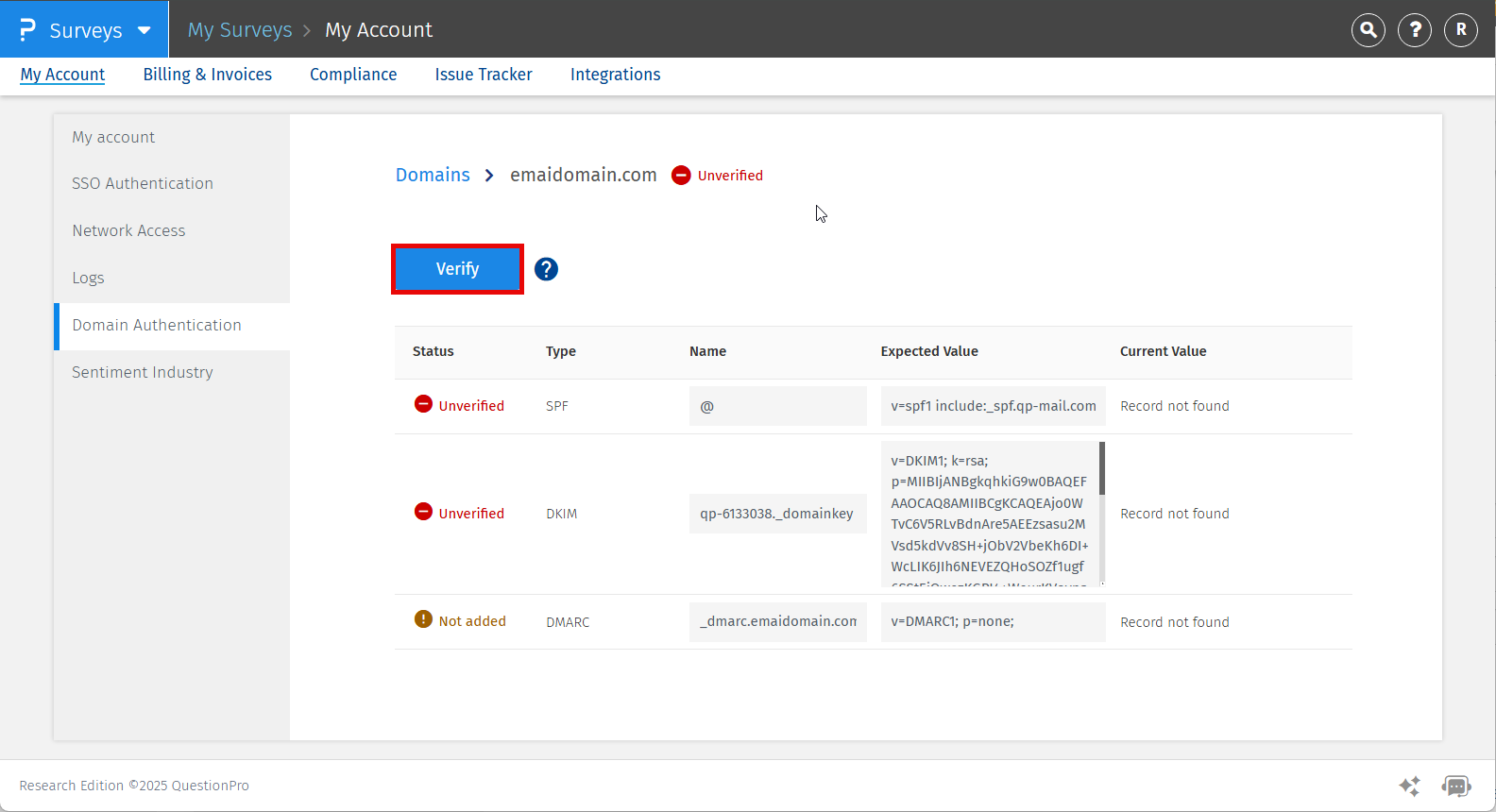
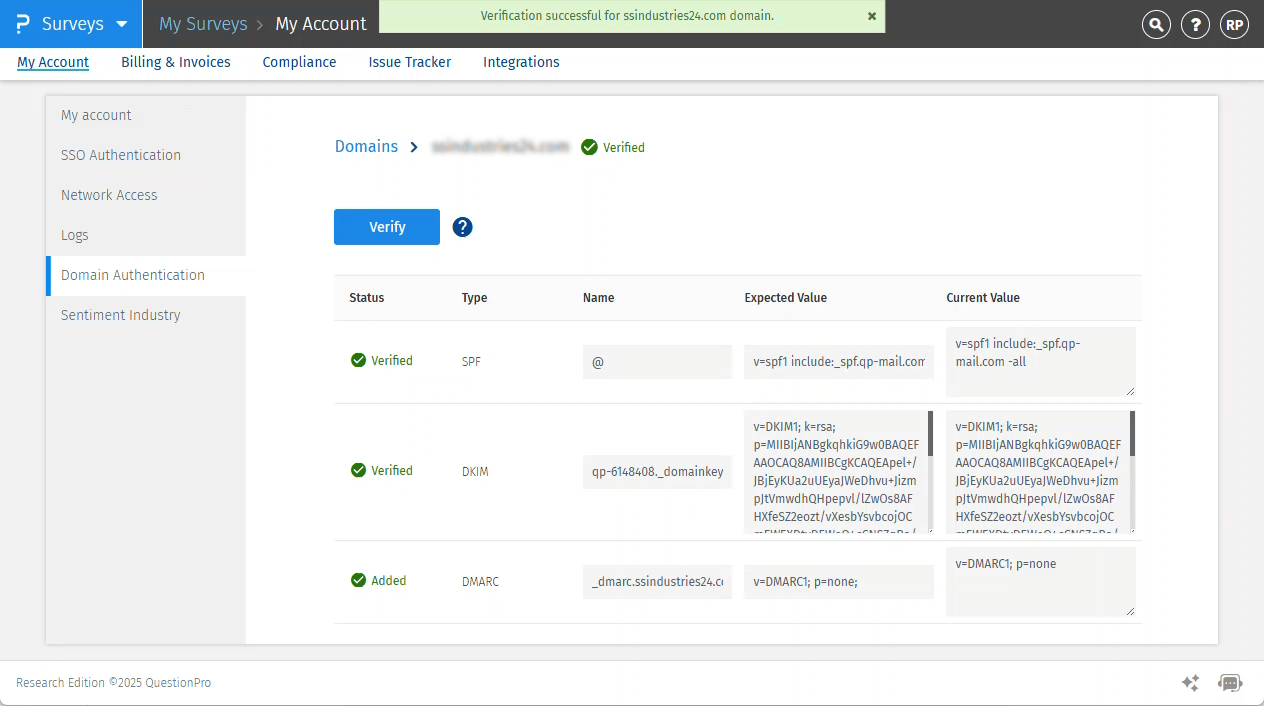
Yes, you can authenticate the same email domain with multiple QuestionPro accounts.
If you're authenticating your email domain for the first time using your initial QuestionPro account, you'll need to follow the standard authentication process as outlined above.
When authenticating the same email domain through a second QuestionPro account, you'll still follow the same overall process. However, instead of configuring SPF and DKIM records again, you'll only need to verify domain ownership.
Below is a quick snapshot of how you can authenticate your E-mail domain within your QuestionPro account.
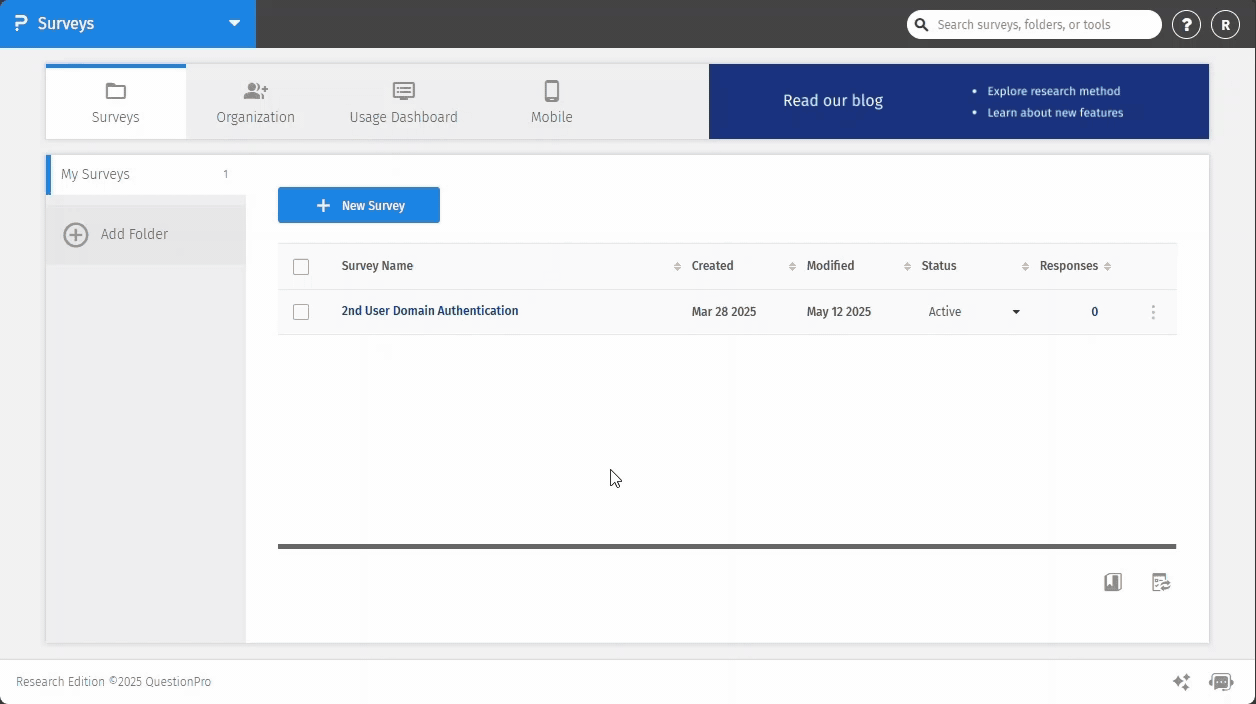
Go to User Profile >> My Account
Click on Domain Authentication option in the left navigation menu. Click on New Domain button.

In the pop-up, enter your email domain and click on the Next button.

In the pop-up, you'll get the domain ownership record. Copy the record and add it to your DNS. Then click on Finish button.
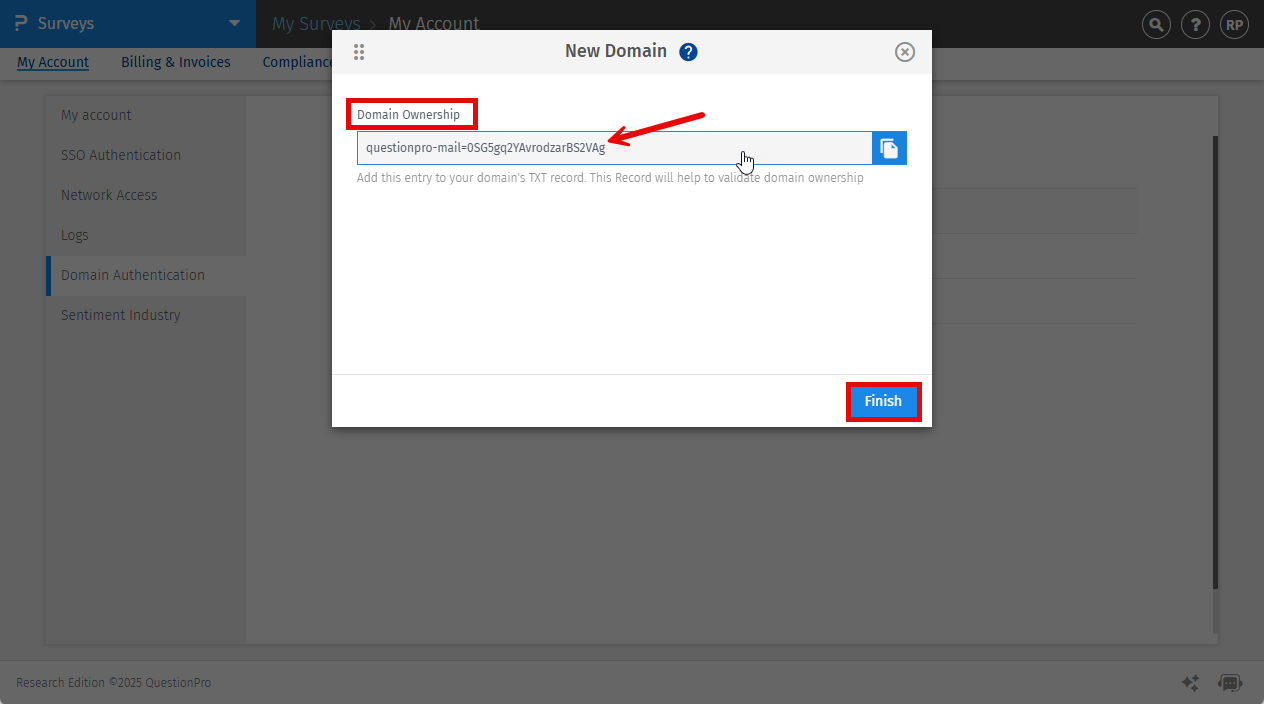
Now, click on Verify button and verify your email domain.
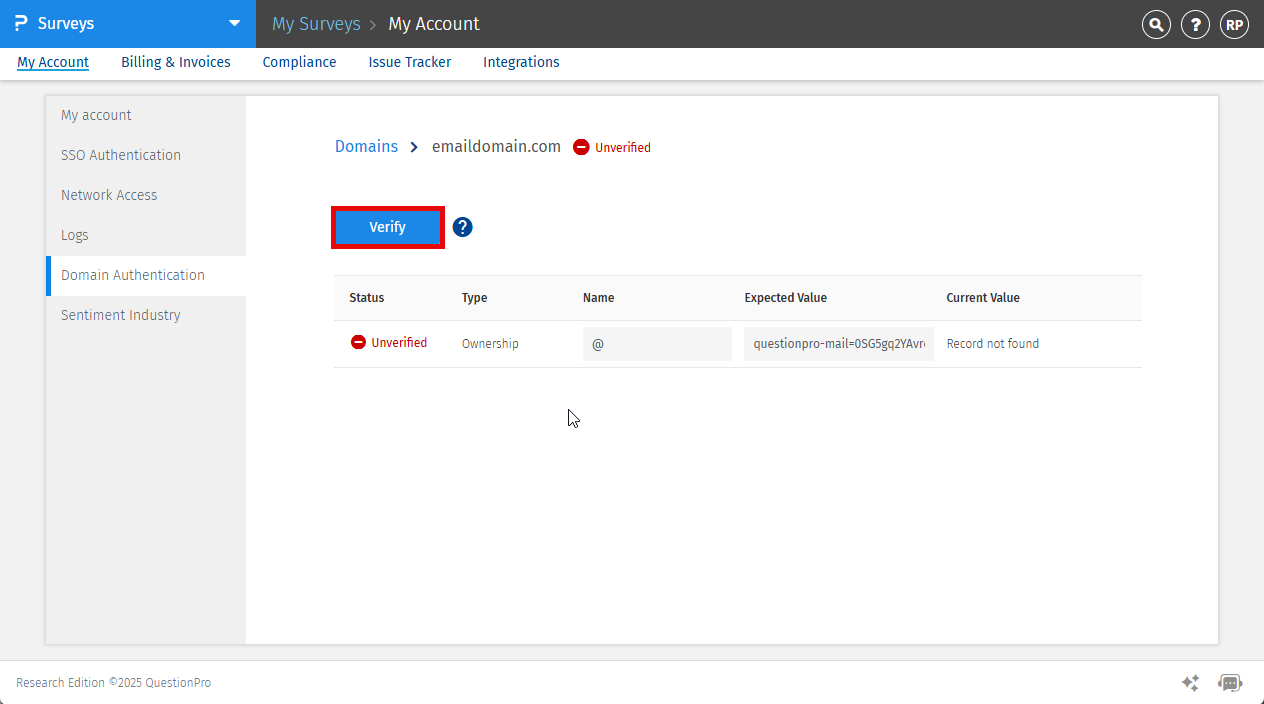
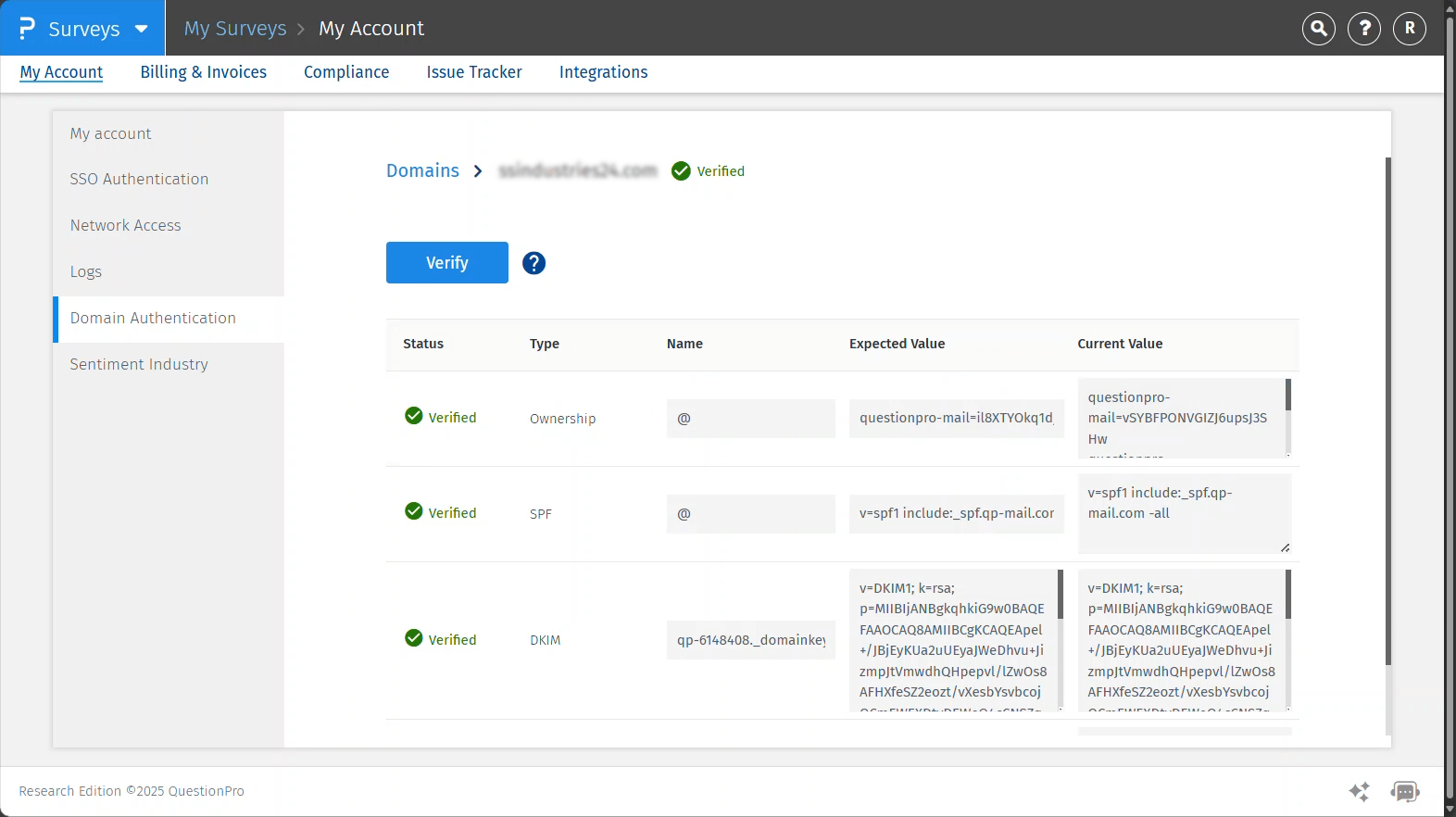
The number of email domains a user can authenticate depends upon their license. Following number of domains can be added based on your license:
| License | No. of email domains |
|---|---|
| Advanced | 2 |
| Team Edition | 5 |
| Research Edition | 10 |
| Communities | 10 |
| Customer Experience | 10 |
| Workforce | 10 |
Domain-based Message Authentication, Reporting, and Conformance (DMARC) is an email authentication protocol that builds on SPF (Sender Policy Framework) and DKIM (DomainKeys Identified Mail) to provide a framework for domain owners to protect their email domains from unauthorized use. DMARC allows domain owners to publish policies in their DNS records that specify how email should be handled if it fails authentication checks. This includes options for rejecting, quarantining, or allowing such emails.
Additionally, DMARC provides reporting features that enable domain owners to receive feedback on email authentication results, helping them monitor and improve their email security posture.
Sender Policy Framework (SPF) is an email authentication protocol designed to prevent email spoofing by verifying that the sending server is authorized to send emails on behalf of your domain. SPF works by checking the sender's IP address against a list of authorized IP addresses specified in the domain's DNS records. This helps ensure that only legitimate servers can send emails for your domain, reducing the likelihood of your emails being marked as spam or forged.
QuestionPro supports following formats of the SPF record:
- Email server domain name: An SPF record using an email server domain authorizes a domain to send emails on behalf of your domain by referencing another domain's SPF record. You can find the SPF records for each data center after this section
- Example: v=spf1 include:_spf.qp-mail.com -all
- Following are the QuestionPro SPF records for each data centers:
Data center SPF record US/Seattle _spf.qp-mail.com US/LATAM _spf.qp-mail.mx | _spf.questionpro.mx US/Dallas _spf.qpsa-mail.com US/Gov _spf.qpgov-mail.com Europe _spf.qp-mail.eu Canada _spf.qp-mail.ca Australia _spf.qp-mail.com.au UAE _spf.qp-mail.ae Saudi Arabia _spf.qp-mailsa.com
- SPF Macros: SPF macros provide dynamic flexibility by allowing you to include variable information in your SPF records. This is beneficial for more complex setups where the authorized IPs might change based on certain conditions or parameters.
- Example: v=spf1 ip4:%{i} -all
- SPF macros are identified by unique single letters or characters enclosed in curly braces { } and preceded by a percent (%) symbol, representing separate components inside your SPF record.
- IP Address Addition: You can directly add IP addresses to your SPF records through your DNS settings. This allows for precise control over which IP addresses are authorized to send emails on behalf of your domain.
- Example: v=spf1 ip4:70.42.174.1 ip4:72.5.52.193 -all
- Click here to get the list of QuestionPro email server IP addresses.
DomainKeys Identified Mail (DKIM) is an email authentication method that adds a digital signature to the headers of an email message. This signature is created using a private key, while the corresponding public key is published in the DNS. When a recipient's mail server receives an email with a DKIM signature, it can verify the signature using the public key to ensure that the email’s content has not been altered in transit and that it originated from the authorized sender. DKIM helps prevent email tampering and phishing attacks by ensuring the integrity and authenticity of the email content.
This feature is available with the following licenses :

